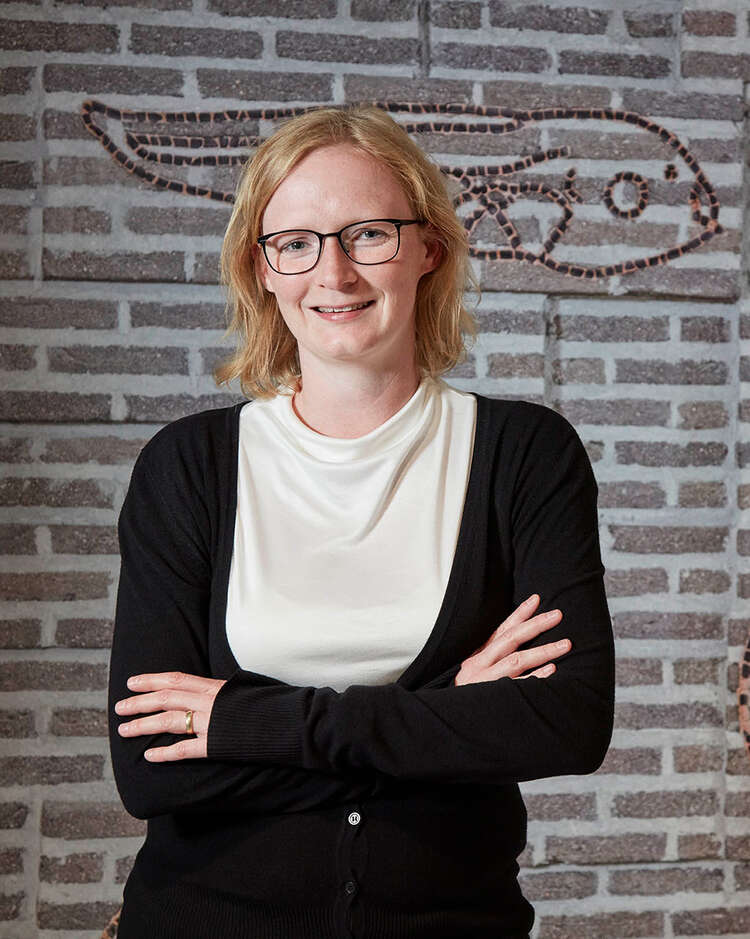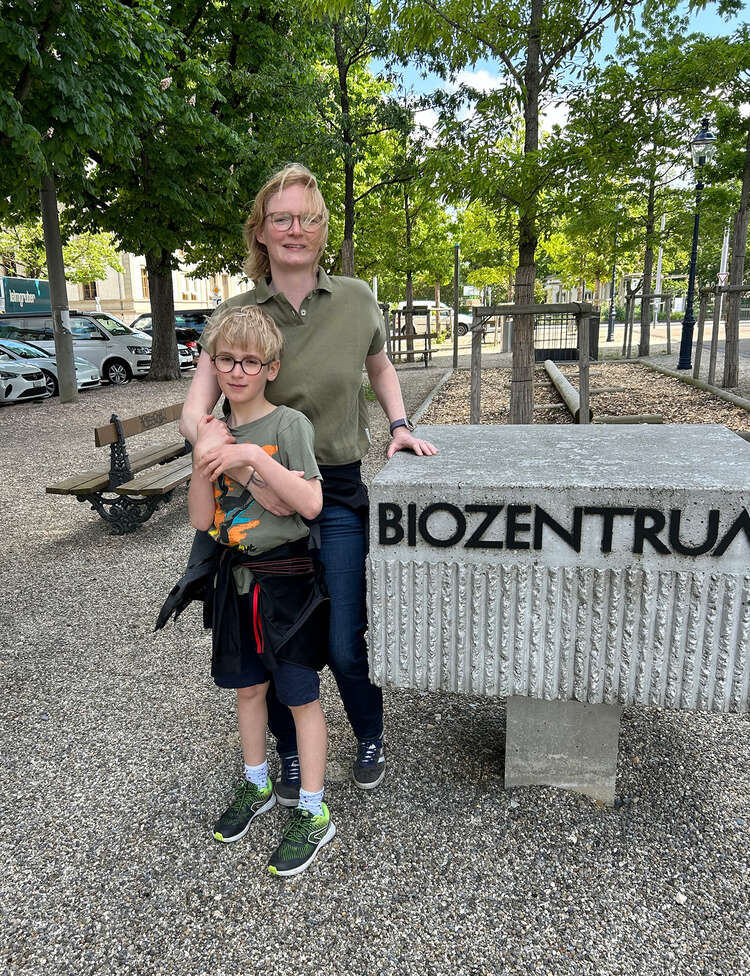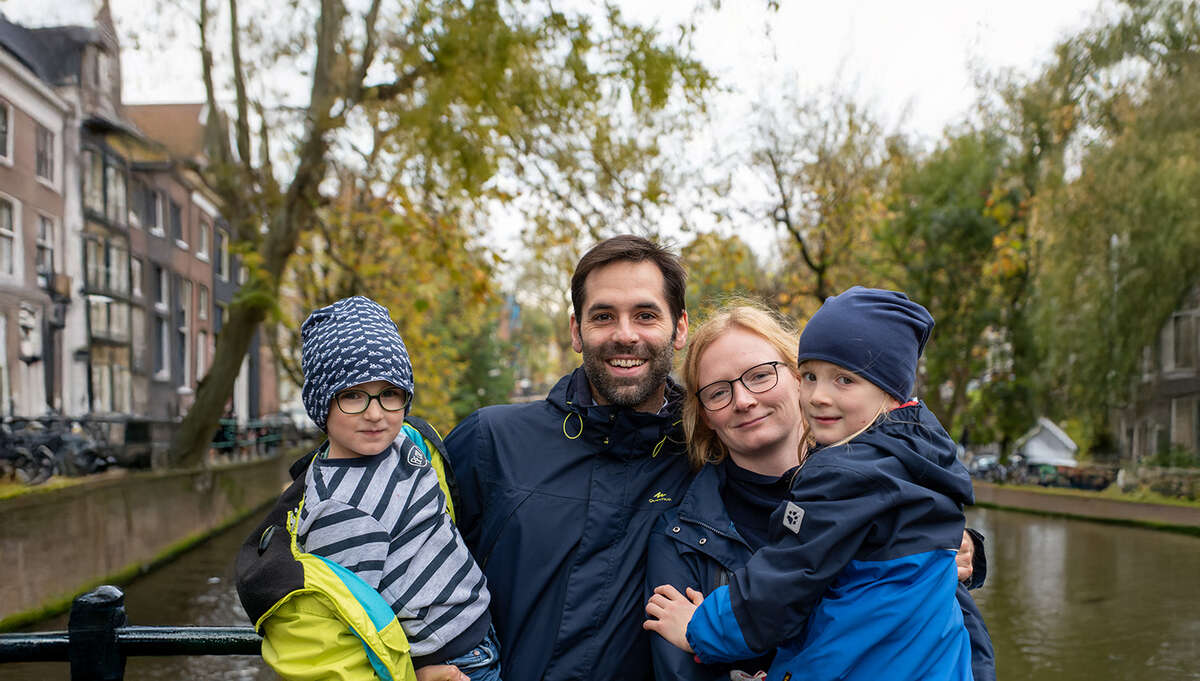Childhood dream: Becoming a scientist
June 2025
Since she was a child, Ina Sonnen dreamed of becoming a cancer researcher. Although her academic career took a slightly different path, the topic of cancer has never quite left the Biozentrum alumna.
You studied biochemistry and now lead a research group at the Hubrecht Institute in Utrecht. A pretty straightforward career. Did you always want to become a scientist?
Yes, actually that idea stuck with me when I was in school, even though I didn’t really know what doing research meant at that time. For one thing, I had a great biology teacher, and for another, my father was diagnosed with a brain tumor when I was nine years old. So, I basically grew up with cancer being a part of our lives. Once I understood more about it, I wanted to go into cancer research.
And did you end up in cancer research?
Strictly speaking, no — I have never really worked in cancer research, but all of my research positions have been related to cancer in a broader way. For me, it was always about understanding the underlying mechanisms, so I always did basic research. That’s the basis for everything.

Ina Sonnen leads a research group at the Hubrecht Institute in Utrecht, the Netherlands. She studied biochemistry at the University of Jena and completed her PhD under Prof. Erich Nigg, first at the Max Planck Institute of Biochemistry in Munich, and from 2009 at the Biozentrum in Basel. After a postdoc at the European Molecular Biology Laboratory (EMBL) in Heidelberg, she moved to the Hubrecht Institute in 2018. She has a daughter and a son, aged 12 and 10.
What are you currently working on?
That’s a bit of a longer story. During my postdoc at EMBL in Heidelberg, I studied signaling dynamics. Previously, it was thought that signaling pathways are either turned on or off — and in this way cell division and differentiation are controlled. But now we know that signaling is dynamic.
Can you explain that a bit more?
Signals can go up or down. But signals can also oscillate — meaning they rise and fall periodically. It’s like an old-fashioned radio: radio waves are modified through AM (amplitude modulation) and FM (frequency modulation) to transmit sound. Cells can "read" these oscillating signals and use them to pass on information. For a long time, we didn’t know whether these oscillations had a biological impact.
And what did you find out?
During my postdoc, I established a microfluidic system that allowed us to manipulate these signal oscillations. This enabled us to show that they play a role during embryonic development. When I started my own lab, we wanted to find out whether this is also the case in other tissues. And indeed, we were able to detect such oscillations in small intestine, known as intestinal organoids.
What did you learn from that?
It turns out that fast oscillations lead to one cell type, slower ones to another. That’s a completely new mechanism of how cell differentiation is regulated. This mechanism was completely unknown before, at least in the gut. So the big questions now are: How can different oscillations cause different outcomes? And how do cells detect these signal oscillations? These are the next questions we want to investigate.
How does this relate to cancer?
We know that signaling in the gut is a dynamic process. The question is now: How do tumorigenic mutations, which are implicated in the development of colon cancer, affect these signaling dynamics? We have started investigating how such mutations influence signaling dynamics. The next step is to extent this analysis to patient samples.
So the circle gets closed?
Exactly, and that’s very satisfying. We’re still doing basic research on embryonic development, but now I also get into cancer research. But even during my PhD with Erich Nigg — first at the Max Planck Institute in Munich and then at the Biozentrum — there was an indirect link to cancer. I was working on cell division, which is, of course, fundamental to cancer research.
During your PhD, you moved with Erich Nigg’s group from Munich to Basel. How was that for you?
I didn’t mind at all. A group of six or seven of us moved together to Basel, which really brought us closer. We had two apartments next to each other near the Kaserne — which we later realized was basically in the red-light district! (she laughs) And just recently, I found my old “Wickelfisch” swimming bag, which brought back so many good memories — swimming in the Rhine included.
You revived some of those memories at the World Alumni Day…
Yes! I was really impressed by how much has changed. Everything is so modern. When we came to the Biozentrum with Erich Nigg in 2009, it was all about planning the new building. Erich worked closely with the architects. It was interesting to see what was realized — and what didn’t. I was also happy to meet Alex Schmidt from Proteomics and Oliver Biehlmaier from the Imaging Core Facility. We all started on the second floor at the same time, since setting up the Core Facilities was Erich's priority.
You’ve been leading your own team since 2018. Was it a challenge to get started right after your postdoc?
It was definitely a jump into the deep end. The challenging part is that you are trained to do research — but not to lead a team, write grant proposals or manage budgets. But everyone trusts in you. That first year was pretty tough. I often thought, “Oh dear, what am I supposed to do now?”
Where did you get support?
All of us new tenure-track group leaders built up a network. We met once a month to talk about the challenges we were facing. Just knowing everyone else was dealing with similar issues helped a lot. My seven years on tenure track are actually already over — a few weeks ago I submitted my tenure dossier. And just recently, I have learnt that I have been promoted to senior group leader.

World Alumni Day 2023:
Ina Sonnen and her son next to the iconic Biozentrum stone.
Have you also settled in privately after seven years in the Netherlands?
I really liked it from the start — people here are so relaxed and open. A lot of folks speak both English and German, which made things easier in the beginning. I’m originally from near Dortmund, close to the Dutch border, so maybe the similar mentality helped us feel at home quickly.
And do you also speak Dutch?
Right after we moved, I took an intensive Dutch course for German speakers. After four weeks, I passed the exam. It wasn’t that hard! (she laughs) But I really started speaking Dutch during the COVID pandemic. We were all at home and talked more with the neighbors. I am convinced that it’s always good to speak the local language — even if English is used at work. The informal stuff — the networking — often happens in Dutch. My kids learnt the language in just two months.
So you moved to Utrecht with the whole family…
Yes, and I have to admit, it was a bit stressful at first — I felt like I was dragging everyone along with me. But that’s part of working in research. My husband didn’t have a job at first, but then he quickly found one as a doctor at the hospital. It was really important to me to continue my research, even with kids. It doesn’t have to be either-or — you can definitely do both. But you can’t do both perfectly. However, the most important thing is having the right support system, such as a partner who fully supports you.

Ina Sonnen and family in Utrecht.


